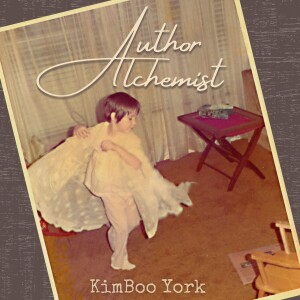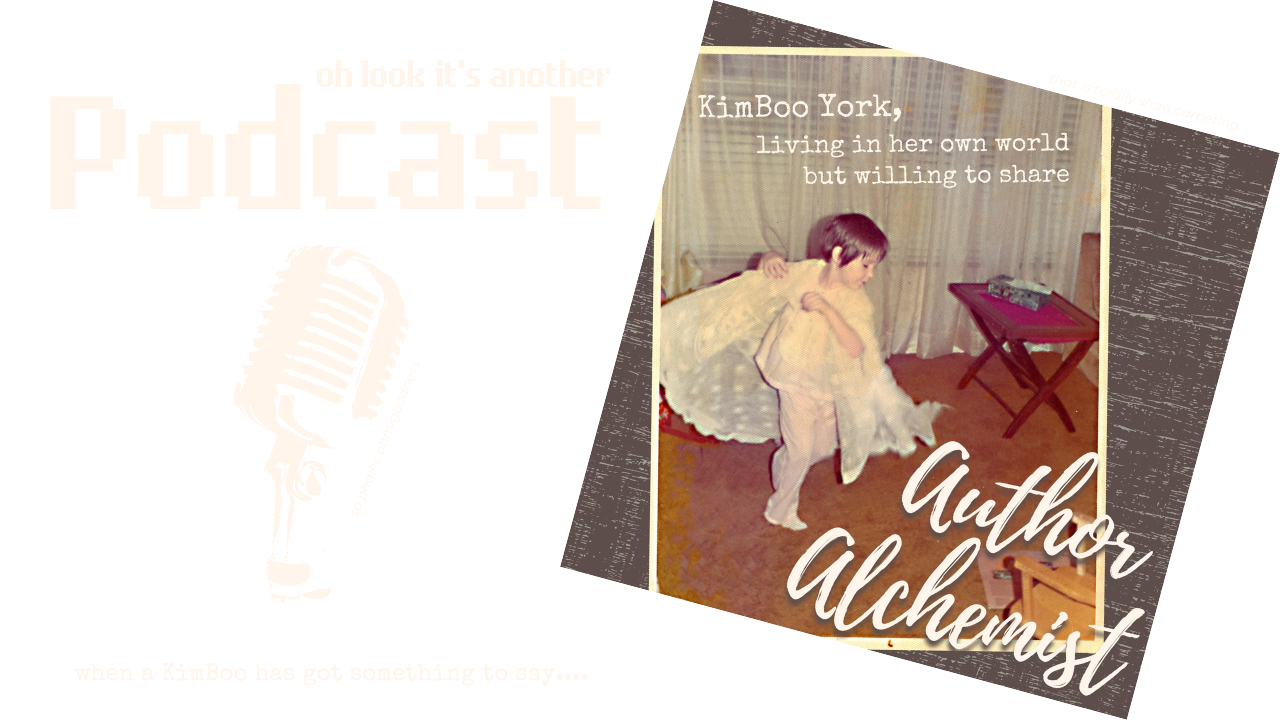Episodes

Thursday Oct 19, 2023
Thursday Oct 19, 2023
A short episode about a question I was asked last week, and how answering it has changed the course of my writing career.
----------
Check out ALL THE THINGS! It's all at House of York!

Sunday Oct 08, 2023
Sunday Oct 08, 2023
She's BAAAACK! After a full year of letting this podcast languish, I decided I needed to jump back into the saddle. I have a lot going on, including new author platforms and new stories and new goals.
If you've wondered where I went and what I'm up to, this is the episode for you!

Friday Sep 29, 2023
Friday Sep 29, 2023
Better late than never! I'm back with an episode I recorded last year, and is the final episode in my mini-series about our deepest fears. Stay tuned for my next episode, which will go over "What the heck has KimBoo been doing since 2022????"
But for now, in THIS episode, I talk about why it is so important to love your characters deeply and passionately. Yes, even the characters who are unlikeable or problematic! You need to hold emotional space for them so that you can write them compellingly and avoid flat characterizations. Save the objectivity for the editing stage!

Friday Jul 22, 2022
Friday Jul 22, 2022
The third installment of my Deepest Fears series focuses on "writer's guilt" and, in a round'about way, our fear of guilt. Oftentimes we slap a label on what is holding us back from writing, calling it perfectionism or guilt, when it is in fact a deep-seated fear of those very emotions. It sets up a dangerous feedback loop of negative emotions that can be hard to break! Hopefully this episode will help you identify what your real stumbling block is and provide you with ways to deal with it!
Links referenced:
A very very old blog from 2012 on Writer's Guilt
Building your support network (Ep 007): An early Author Alchemist Podcast discussing the positive and sometimes negative aspects of your support network

Friday Jul 08, 2022
Friday Jul 08, 2022
Welcome to the second episode in a mini-series I’m doing about confronting our deepest fears as authors! Fear of being vulnerable is at the core of many of the fears that keep authors from writing, and in this episode I am taking aim specifically on the fear of being seen and of being shamed.
I cover the ways guilt and shame are not the same thing, and techniques you can use to understand what you are feeling and how to deal with it. The goal is always to get you back to writing what you love!

Tuesday Jun 21, 2022
Tuesday Jun 21, 2022
Welcome to the first episode in a mini-series I’m doing about confronting our deepest fears as authors. This is not simply about the fear of being bad at writing, or the fear that no one will read our work, but rather about the fears that keep us from writing in the first place…which often circle back around to simply one word: vulnerability.
Fear of vulnerability can take many forms, though, so I’ll be diving deep into the types of fears we may have about being “seen” for who we are as writers and as people. First up: fears about being labeled as “self indulgent” a.k.a. writing self-insert/mary sue characters. Yes, I talk about James Bond. Yes, I talk about Rey Skywalker. No, I don’t believe writing mary-sues is intrinsically bad. Fight me!!!!
References:
Fanlore entry explaining “mary sue”
“2018 is the year we stop wasting our time on discourse and start writing the self-insert naruto fics we’ve been planning since we were eight. Thank you.” Source: http://kimboosan.tumblr.com/post/169561118551/harpygf-2018-is-the-year-we-stop-wasting-our

Tuesday Jun 07, 2022
Tuesday Jun 07, 2022
A recurring theme in a lot of advice about creativity is "show your work/share your work." It is often hailed as a great way to "grow your audience" but I want to go a step beyond that and talk about how it is a great way to stay motivated and find inspiration, even if what you have to show is not polished and perfect yet.
I've grabbed three classic modern stories that were created and molded on the internet as examples of how wonderful and inspiring it can be to simply show your work!
Links!
God of Arepo
Original tumblr posts
The lovely comic
Neighbor Steve (Antler Guy Saga)
On AO3
Original tumblr post
Stabby the Space Roomba
Example 1
Example 2
Set Godin’s Akimbo podcast
My podcast on the War of Art
Struthless on YouTube ("Weekly Videos about Creativity")

Friday May 27, 2022
Friday May 27, 2022
Giving yourself permission to sit down and write is a major hurdle most writers face...but then what? The next step is giving yourself the permission to succeed as a writer, however you want to define "success."
That can be just as hard, though. We all say we want to be successful, but do we feel like we have earned that right? In this episode I use Elissa Altman's fantastic post from 2016 "Writing and the Permission to Succeed: The Intersection of Art and Shame" as a jumping off point to talk about struggling with expectations, hopes, and dreams.
Resources:
Elissa Altman's award winning blog
Discovering the Inner Mother: A Guide to Healing the Mother Wound and Claiming Your Personal Power by Bethany Webster
Still Writing: The Perils and Pleasures of a Creative Life by Dani Shapiro

Sunday May 08, 2022
Sunday May 08, 2022
There are a lot of tools out there which are designed to help you be a better writer, but did you know there are also a lot of tools that can help you simply write the words? There are! In this episode I talk about apps, communities, and systems that you can use to help you get the words out of your head and into a document!
Resources mentioned:
https://www.putwordsdown.com
https://v2.writeordie.com
https://4thewords.com
https://writingstreak.io
https://www.writetosmite.com
https://imissmycafe.com (w/ pomodoro timer!)
Sprint bots on discord servers

Friday Apr 29, 2022
Friday Apr 29, 2022
This is all about one of my favorite motivational books for writers, The War of Art by Steven Pressfield (Note: this is an affiliate link with bookshop.org!). This is justifiably considered a modern classic in the field of motivating and inspiring authors, with great insights into productivity and our eternal nemesis, Resistance.
However, it's not perfect, and in this episode I talk about the good, the bad, and the ableism.

KimBoo is your Authorial Alchemist!
Writing is magic but that doesn't mean it is easy! In this podcast, KimBoo York aka The Author Alchemist focuses on the most annoying part of being a writer: writing! After all, you can't become a better writer if you aren't actually writing anything, amirite???!? With a focus on motivation, inspiration, hard work, and fanfiction, this podcast is for writers who are determined to Get Their Words Out.








